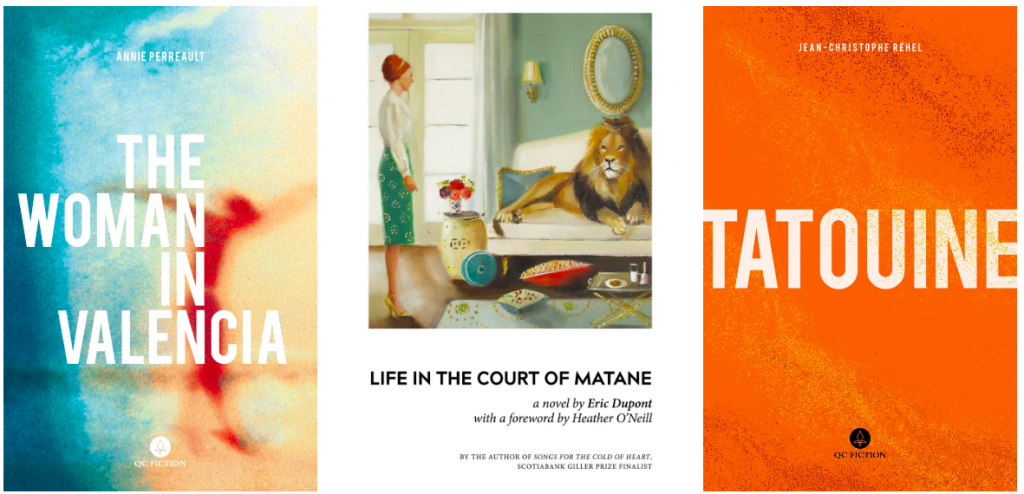by J. B. Staniforth
The challenge for publishers translating Quebec’s French literature for an English audience is simple but insidious, according to Peter McCambridge: English readers don’t expect it to be any fun.
“I think a lot of English Canada considers reading a book in translation from Quebec to be a bit like eating their vegetables,” says McCambridge, editor of QC Fiction, an imprint of Baraka Books featuring Quebec literature in translation.
Quebec authors working in French tend to take chances, and flout norms and authority—“like Quebeckers themselves,” McCambridge says. “Quebec writers can get away with more in French than English writers do in the rest of Canada. Much of the writing tends to be quite un-politically correct; some of it can’t be translated because of that. A lot of what’s published in French is irreverent and slangy and largely untranslated, [belonging] to this tradition of writing that doesn’t take itself too seriously, but nevertheless has plenty of interesting things to say.”
Pow Pow Press is an offshoot of graphic novel publisher Éditions Pow Pow, offering Quebec graphic novels translated into English. Pow Pow’s Alexandre Fontaine Rousseau notes that Quebec’s comics culture mixes elements of the American comic tradition with that of the European bandes dessinées, though Quebec comic artists remain outsiders to both.
“I can’t put my finger on what it is, but there’s a mix of influences and cultural inspiration that’s pretty unique to this spot,” Rousseau says. “It creates a bande dessinée that’s neither this nor that—it’s its own thing, but it’s subtle.”
It helps that the readership for comics and graphic novels in Quebec is enormous. “There may be as many people in the small market of Quebec who are interested in comics as there are English Canadians interested in English comics made in Canada,” says Rousseau.

But there’s surprisingly little market for Quebec bandes dessinées in Europe. “Even if we have the same language as Europe, there’s still an ocean between us,” Rousseau says. In fact, Pow Pow’s publisher Luc Bossé was inspired to consider translation after an associate warned him that if he wanted to sell his books in Europe, he’d need to translate them into continental French. Bossé was intrigued by the idea of translation—but it made a lot more sense to translate Pow Pow’s books into English.
The key is determining what will translate. Rousseau says works need to be relatively general in subject, and not lean on specifics of Quebec culture—like jokes about legendary Montréalaise La Bolduc.
“You’d have to hold the reader by the hand and tell them, ‘So La Bolduc was this singer…’ By the time the person understands the joke, the punchline was four pages ago!” Rousseau laughs. “That’s not effective! Humour—jokes—are the hardest thing to translate. To translate humour into English, you’re going to do not only translation, but adaptation work. That can neuter the flavour of the original. I see the translation not as a rendition of the original, but as sort of a weird new version that exists in a parallel universe.”
Quebec literature requires translators who can reflect the spirit of the writing, says McCambridge, who complains that Quebec lit previously relied upon a tiny handful of the same translators. Accordingly, he says, “lots of books in translation read as though they were all written by the same writer, no matter who the author was in French. I would say 99% of literature in any language doesn’t sound like Proust, but you wouldn’t think that if you looked at what everyone reads in translation on Goodreads. So we’re trying to focus on the good books from Quebec that don’t read like Proust, but are still entertaining and well worth your time.”

McCambridge works frequently with young translators as well as first novels, an approach he says requires extensive work with and input from the author.
“From start to finish,” he says, “our translation philosophy is: What would the writer have put had they been writing in English? How would this sound naturally?”
Despite the challenge of translating works set in Quebec and relating to Quebec culture, Rousseau says, “If you find the right balance, that local flavour is the thing that will set it apart in a foreign market.” He cites Francis Desharnais’ Little Russia (translated by Helge Dascher), a graphic history of a community near Abitibi that worked as a commune. Desharnais’ grandparents lived there for many years, giving 50% of their income back to the collective.
“As much as it’s about this strange frontier mentality toward the north, it’s also about different social models,” Rousseau explains. “That book we ended up translating because while it’s rooted in Quebec history, you can have access points as a reader.”
QC Fiction’s titles run the gamut from Mélissa Verreault’s Behind the Eyes We Meet (translated by Arielle Aaronson), which McCambridge says “flirts with chick-lit” but also the First World War; to Mathieu Poulin’s Explosion (translated by Aleshia Jensen), a mockumentary faux-biography of Michael Bay; to Éric Dupont’s century-and-globe-spanning Songs for the Cold of Heart (translated by McAmbridge himself).
Usually it’s only “the more serious, literary writers [who] tend to make it over into English, and this is another thing I’m trying to redress with QC Fiction,” McCambridge says. If he succeeds, it’ll mean convincing English readers that books written in Quebec these days are rarely ever about Quebec, or Quebec’s traditional political concerns in relation to Canada.
“Young writers today are so outward-looking and adventurous that calling their novels ‘Quebec literature’ seems a little restrictive. These are very much international novels.”
J.B. Staniforth is a Montreal writer and reporter.